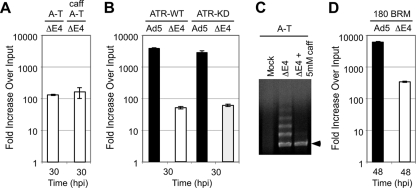FIG. 4.
DNA damage signaling does not affect Ad replication. Cells were infected with either wild-type Ad5 or dl1004 mutant. Viral DNA was extracted at the indicated time postinfection for analysis by qPCR and PFGE. Accumulation of viral DNA is represented as the fold increase over input viral DNA, determined at the 4-h time point. (A) Replication of E4-deleted virus was defective in A-T cells with or without 5 mM caffeine. (B) E4-deleted virus was not rescued when ATR signaling was compromised by overexpression of inducible kinase dead ATR. Cell lines derived from U2OS that express inducible wild type (ATR-WT) or kinase dead (ATR-KD) ATR transgenes were induced with doxycycline and infected with Ad5 and dl1004 for 30 h. (C) Caffeine treatment (5 mM) blocks concatemer formation in A-T cells. DNA was prepared at 30 hpi and analyzed by PFGE. Viral DNA was visualized by staining the gel in Sybr green, and the position of linear viral genome is indicated by an arrow. (D) Viral replication in cells with mutant DNA ligase IV. The 180 BRM cells were infected with Ad5 and dl1004 (MOI = 100) and harvested for qPCR analysis at 48 hpi. Replication of the E4-deleted virus was not rescued in these cells, where concatemers were not formed.

